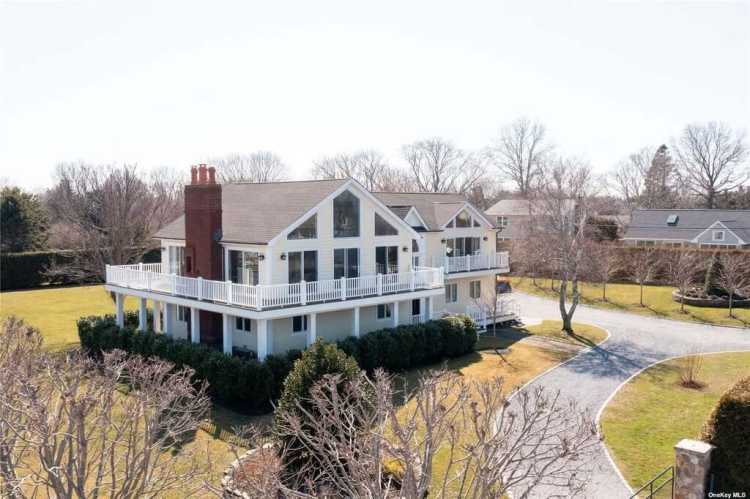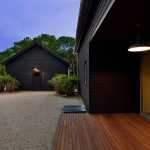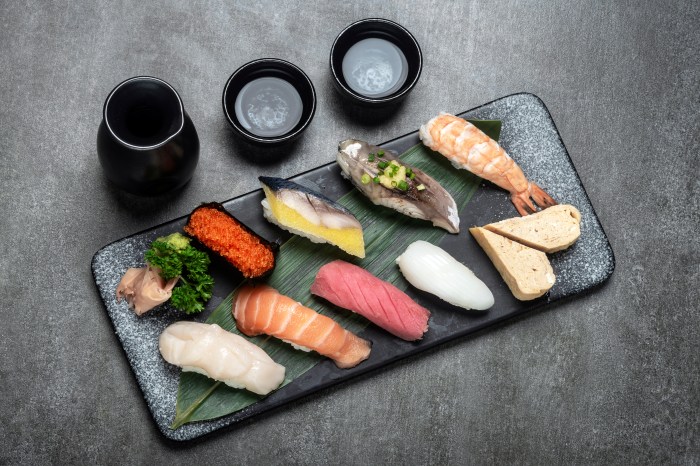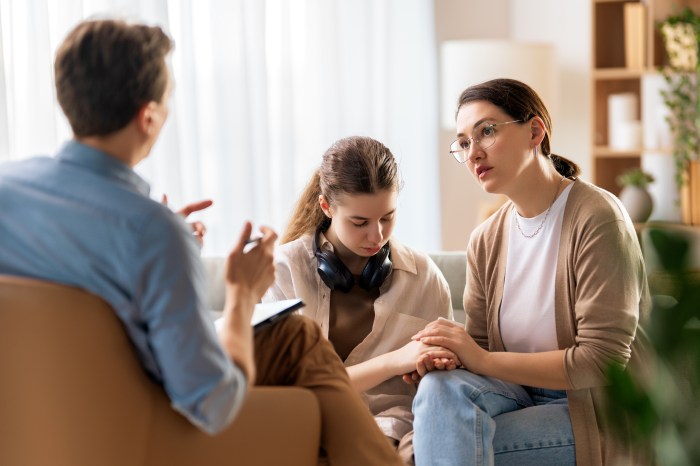Head east on the North Fork to discover not only the quaint hamlet of Orient but also a small linen and home goods store, where the hum of a sewing machine can often be heard as the wooden screen door opens and shuts.
Like the Village Lane store and its handsewn tea towels and manufactured quilts, the area is all a throwback, one that the next generation is enthusiastically embracing. “It looks very frozen in time,” says Janet Markarian, who started Orient Linen Co. more than 20 years ago, joined recently by daughter Abigail Collier.
For as long as Collier can remember, her mother had the store in a space attached to their house, which was a barber shop in the 19th century.
Though Collier picked up knitting and crocheting as a child and sold woven potholders outside the store, she took a very different career. She spent four years producing television news on the overnight shift at CBS News before covering domestic politics for The Recount, a digital news outlet.
After two years working remotely in Orient during the COVID-19 pandemic, she decided to quit her media job and join her mother’s business.
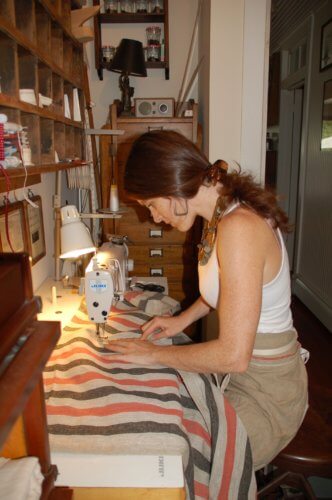
“My eyes would just hurt so much from looking at screens all day,” Collier says of her former career. During the pandemic, she fell in love with “the tactile experience of just putting down [the] screens and selling,” she says.
“During the pandemic we didn’t have much to do,” she continues. “And so mom got out the Featherweight [sewing machine] and taught me how to sew, and I just sewed linen napkins for the shop. And then I sort of graduated to the Juki because it was faster,” she says of the industrial sewing machine. “As soon as she taught me, I just couldn’t stop.”
Markarian has a long background in textiles, weaving and printing.
She majored in photography at the Rochester Institute of Technology in the 1970s, which led to studying photography at Penland School of Craft, in North Carolina, where she recalls she ended up spending the whole time in the weaving studio.
She had always done needlework as a child, and she and her sister had made a lot of their own clothes growing up in Stony Brook, but being in a weaving studio seemed to ignite a passion. She went on to get a master’s degree in textile design and textile history, and received a Fulbright-Hays grant to study pre-Columbian, Andean textiles in Ecuador. She then taught weaving and textile history at The School of Art Institute of Chicago.
“I worked for quite a few years as a conservator at the Metropolitan Museum of Art, repairing and reweaving, and I did a lot of tapestry weaving and hands-on work,” says Markarian. “I still love to sew. When I have nothing to do, I still sit down and sew. It’s just relaxing.”
In the late 1990s, her family, including a kindergarten-aged Abigail, moved from Brooklyn to China where her then-husband took a position in finance.
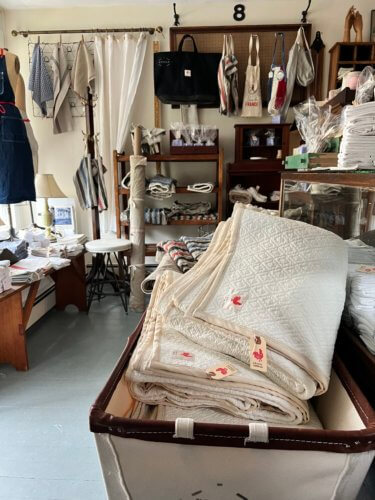
“I found myself as an expatriate wife in Hong Kong with nothing to do but play tennis — and I wasn’t very good at that,” Markarian remembers.
Around the same time, they purchased the house in Orient with the old barber shop attached to it. “So I suddenly had a store — I wasn’t really looking for a store, but the house came with one,” she said.
They were traveling a lot between Hong Kong and mainland China and at that time, she says it was much easier to produce handmade goods in mainland China, which led to an idea: To open a linen store in Orient, New York in the summers.
She decided to call it Orient Linen Company, “which was funny because we were in the Orient and it was Orient,” she says. She came up with the red rooster logo — “that’s a sort of iconic American image, but also it has a lot of significance in China,” where it symbolizes good fortune.
Soon, Markarian began designing and manufacturing her own line of textiles. She started out with quilts, then baby quilts and baby bibs. “I started finding Chinese factories and making linens in China and exporting them back to the store in the summer. And I did, at that time, a lot of hand quilting because hand quilting was doable in China at that point, and some hand embroidery.”
After the September 11, 2001, terrorist attacks, it became increasingly difficult to import even small quantities of goods from China, so she began making more items stateside. Except for one quilt, everything is now made in America, with much of it being made right in the shop on the North Fork.
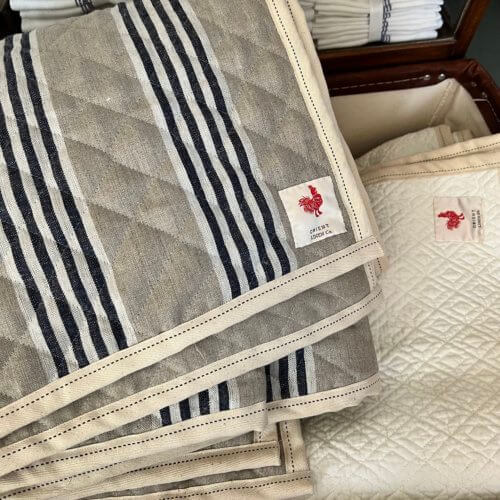
Markarian designs or handpicks each of the products in the store. While they sell various household items, like soap, everything they make — from tea towels to tote bags, aprons to shower curtains — is 100% linen or cotton and is machine washable.
The shop is packed full of household items, from their signature 100% cotton blue and white striped ticking napkins, woven with twill, to linen aprons adorned with a single rooster on the chest, or a bistro apron that ties just at the waist. Many customers are looking for a housewarming gift, they say.
Other items include a hand brush for cleaning vegetables, a Maldon salt & weck jar and a masonry brush.
Quilts are stacked in old-fashioned linen laundry baskets on wheels. Linen shower curtains and aprons hang from hooks on the walls. Prices are handwritten on a chalkboard behind the counter.
When Markarian moved full-time to Village Lane in 2005, she got into real estate, mainly because customers at the shop were always asking her about summer rentals and the like. She joined Daniel Gale Sotheby’s International Realty as an agent, and “the linen store became a licensed satellite office for Daniel Gale Sotheby’s,” she says with a laugh. A summer rentals sign dangles just beneath the streetside Orient Linen Co. rooster sign.
“I’ve been juggling two hats for years, running the store and running my real estate business. Then, when Abby came home for two years, working remotely for COVID, a light bulb went off in her head that, like many people, she had that COVID pivot where she felt that she wanted to do this,” Markarian says.
“I’m thrilled because I’ve always felt it could go to the next level, but I never really had the time. I always had to do the real estate. So, Abigail is taking the reins and I think, already, taking it to the next level that I always wanted to see it become.”
Collier has taken over running the store and managing the business side, while also launching the Orient Linen Co. website for online retail, plus curating the social media content at @orientlinencompany.
She is using her executive skills from television production to further the business. Her mother says they make “a very good team because I am not at all good at the paperwork,” and she points to Collier having already put together a website — “I could never figure that out.”
But, Markarian says, “I’m still the head of the design division.”
Both Markarian and Collier stay busy at the sewing machines to keep up with demand.
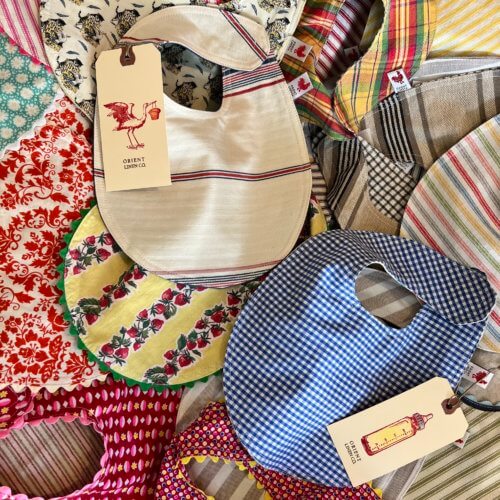
Orient Linen Co. has had “a real core of followers,” Markarian says, while continuing to produce many of the same items for the last two decades.
“Mom has a lot of old customers, though, that live in New York and call us. Every time they know a baby that’s born, we send out a baby quilt for them,” Collier says. “So I’ve noticed, now that I’m newly joining the business, that there are customers that she’s had since 2001 who still call her, still make the drive.”
“We keep the colors really simple,” Markarian explains. “Ticking is a big constant. Blue pillow ticking is something I’ve always used. Neutrals, naturals, linens.”
When she was living in China, she created a lot of patterns, but doesn’t do much of that anymore. “I work mostly with linen that we source out of an American company, but it’s woven, a lot of Eastern European linen — a lot of simple, easygoing, easy-to-match fabrics.”
A white quilt, offered in a baby size through king, is one of their most popular designs. It is quilted in China because it utilizes a cotton batting that they have not been able to source in the United States. They trim it in the shop with custom twill tape.
Meanwhile, a quilted throw is quilted on Long Island and then finished in the shop as well. “We work with a machine quilter on Long Island who has actual machines that go back to World War II,” Markarian says. “They’re not computerized, they are narrow, mechanical quilters. So we’re starting to do some of our striped linen throws again, which were always popular.”
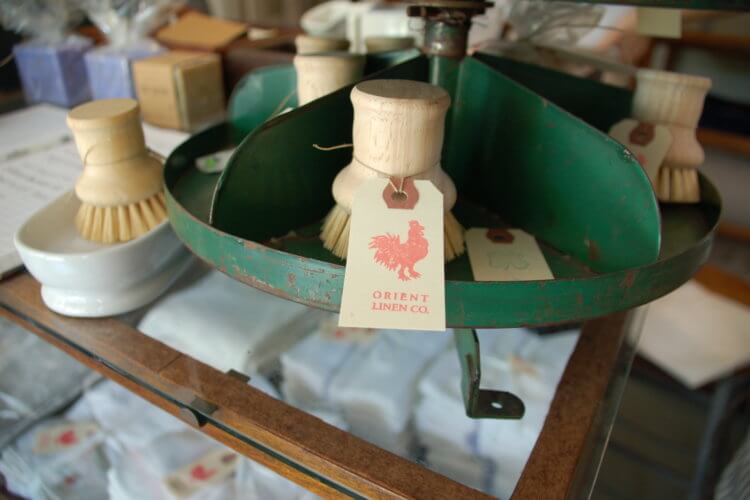
The mother-daughter team is also branching out with new products.
“We get our greatest ideas from our customers,” Markarian says. “Someone came in today and Abby was working with them, and they said, ‘Do you make cocktail napkins?’ And it’s like the fourth person that’s asked us that. So we’re going to start making cocktail napkins.”
This year, Orient Linen Co. offered linen beach towels that were very popular, and they partner with an old American company from Massachusetts on canvas bags that are strong and water-resistant, perfect for the beach, shopping or just about anything.
Markarian does a surprising amount of sewing. “One of the things I like to do is fool around and invent a new product,” she says. “In order to be a good designer, you have to know how to make something. You can’t design textiles if you don’t know how to make them.”
“I have a grommeter and we work with this narrow linen, and I figured out last week how to make an apron out of it without cutting, just by folding it,” she says.
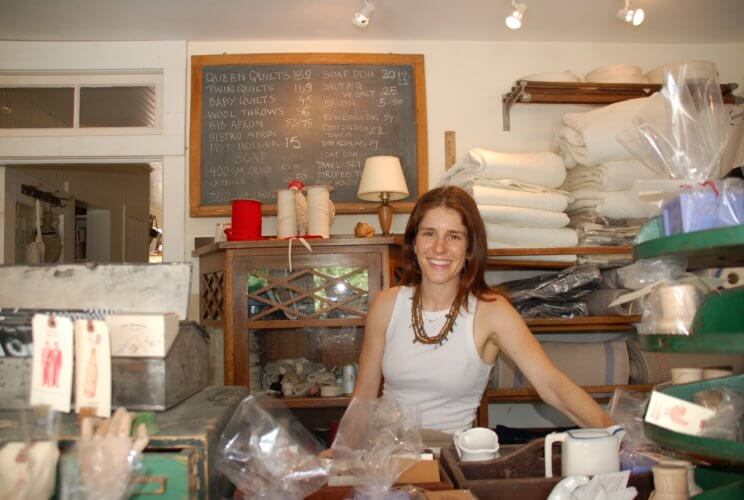
“The problem now,” says Collier, “is that she’ll make one thing — like she made one apron recently out of couche fabric — a bread-baking couche fabric — and one person bought it, and then three people came in the store the next few days asking for it. She sews more than even she would like because then she had to make four aprons.”
But, it doesn’t feel like work to her.
“One of the reasons we have the sewing machine in the store is we’re not just sitting there watching the store, we’re usually making something,” Markarian says.
The shop is right off Markarian’s kitchen. “I can see the store from my stove. I can be baking or whatever. It’s very much part of the house, which is incredibly convenient. I never feel like I have to go to the store, it’s just part of the house.”
Their cat, Mr. Hughes, also frequents the store.
There is a little barn in the backyard, an old carriage house that they are converting into a cutting room. “I used that room in the past and now since Abby’s joining, I’m cleaning the barn out for her office and a design lab.”
Collier is honing her skills and says she has “a long way to go,” but “I wake up every morning and make a napkin while I drink my coffee.” She adds, “I really enjoy sewing, and joining the company has really come from just a love of being a craftsman.
“It’s this really wonderful thing that I share with my mom.”
This article appeared as the cover story for the September 2022 issue of Behind The Hedges. Read the digital version here. To read past Master Craftsman columns, click here.




